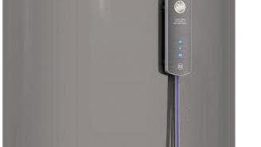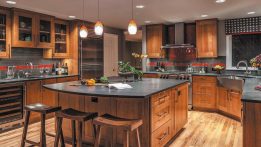You may have heard of baby proofing your home, but many people don’t talk about the changes you may need to make in your home as you age. You may need to change something small like moving certain items to a lower shelf so that you don’t have to get on a ladder as often, or you may need to make changes on a larger scale. Of all the changes you can make to your home to make it a safer environment for you to age gracefully in, one of the most important is determining if your floors are slip resistant enough to prevent any dangerous falls.
With all the flooring options available, and there are many, some are more dangerous and hold more potential for falls when wet or dirty. Falls in the home are a leading cause for injuries in seniors, so it is not only important to determine if your floors are slip resistant but also to consider how hard they are in case a fall does occur. Carpet is the one flooring material that is completely slip-resistant and soft in case of a fall. However, it is not suitable for all rooms in your home (e.g. bathroom, kitchen), and these are actually the areas that are most prone to slippery conditions due to spilled water or grease messes. This means that even if you have carpet in a clear majority of your home, you are not in the clear just yet.
The most ambitious method of slip-proofing your floors is to just replace all the flooring in your home with one that is less slippery. Most flooring options are fine when dry, but the real differences show when water or grease is present. Some less slippery options are: linoleum, vinyl, cork, hardwood, bamboo, and laminate. With each choice, there are some benefits and some drawbacks:
Linoleum
 PRO: Linoleum is easy to clean, durable, and natural. It does not hold on to dust and pollen like carpet, and it is water and stain-resistant to an extent, making it ideal for kitchens and bathrooms. Linoleum is also smooth and flat, perfect for wheelchairs, and it is made with natural materials.
PRO: Linoleum is easy to clean, durable, and natural. It does not hold on to dust and pollen like carpet, and it is water and stain-resistant to an extent, making it ideal for kitchens and bathrooms. Linoleum is also smooth and flat, perfect for wheelchairs, and it is made with natural materials.
CON: Linoleum can be quite pricey, and it is a hard surface that can become rather cold in the winter months.
Vinyl
 PRO: Vinyl is highly water resistant and relatively cheap. It is also very smooth, making it ideal for wheelchair access, and it is not as hard as tile.
PRO: Vinyl is highly water resistant and relatively cheap. It is also very smooth, making it ideal for wheelchair access, and it is not as hard as tile.
CON: Vinyl might not look the best in all the rooms of your house. The seams between vinyl planks can also cause problems with standing water. If you plan to use vinyl in a bathroom or kitchen, you may want to consider using whole sheets to minimize the number of seams.
Cork
 PRO: Cork is a softer material than the others mentioned. If any falls were to occur on this surface, they would be more cushioned. It is easy to clean and maintain, but it is very important that a sealant is placed over the entirety of the flooring to protect the porous surface from stains.
PRO: Cork is a softer material than the others mentioned. If any falls were to occur on this surface, they would be more cushioned. It is easy to clean and maintain, but it is very important that a sealant is placed over the entirety of the flooring to protect the porous surface from stains.
CONS: Because cork is so soft, it is susceptible to damage from sharp or heavy objects like kitchen utensils or furniture. Be sure to clean up spills quickly to avoid standing water entering any seams and damaging the flooring.
Hardwood, Bamboo, and Laminate
 PRO: These options look the best, and each alternative is varying in price to allow you to get the look you want whatever your budget. Wood flooring can be relatively easy to care for and does not get as dirty as carpet.
PRO: These options look the best, and each alternative is varying in price to allow you to get the look you want whatever your budget. Wood flooring can be relatively easy to care for and does not get as dirty as carpet.
CON: While these options can be easy to clean, they are not water-resistant enough for bathrooms, and the maintenance required with wood in the kitchen can be quite tricky. Standing water can cause permanent damage, and dirt and grit can damage the finish.
If replacing all the flooring in your home is too great (or expensive) an undertaking, there are steps you can take to make your current flooring option more slip resistant. You should especially pay attention to these options if you have predominantly stone, ceramic, or tile flooring in your home. These are by far the most slippery surfaces and can pose quite a hazard when combined with spilled water. To make these surfaces safer, you can use slip-resistant treatments to decrease the risk of slips and falls. The two basic options are abrasive floor coatings and chemical etchings. Abrasive floor coatings include a gritty substance that increases traction on smooth flooring. Chemical etchings are an acid wash that is typically applied to stone floors, concrete, or porcelain. Be careful with application, however, because if the acid is left too long on the flooring it can erode the material beyond what you need. Your best bet may be to hire a professional to ensure the acid wash is applied correctly. With both these treatments, be aware that they will wear off and must be reapplied every so often.
If neither of these options work for you and replacing your flooring is just not in your budget, a few strategically placed rugs that are securely fastened to the floor can help you limit the amount of slippery surface area available. The caveat with rugs is that if they are not securely fastened, they can become even more dangerous than the slippery floor you are trying to cover. Take care to secure the rug using double sided tape or nonslip traction mats.
Falls in the home account for a large majority of the injuries experienced by seniors and the aging population. Making sure that your home is a safe environment is a priority, and assessing your flooring is a great place to start. Some of the options mentioned above can limit your risk for slips and falls, but be sure to maintain good housekeeping so that you can further reduce the possibility of a slip. Taking these precautions can ensure that you can continue to live comfortably and safely in your home. ![]()
Katerin Rodriguez
Home & Yard Magazine




